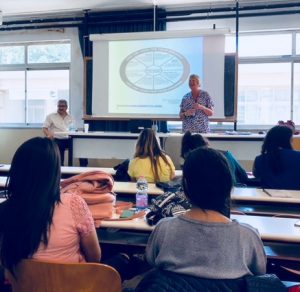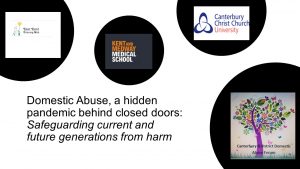January 22 to March 23:Teaching the 8 week mini module at The Kent and Medway medical school: Student Selected Component : year 2 trainee doctors.
6 week module for year 1 trainee doctors April 22-23
| LEARNING OUTCOMES:
· Demonstrate a critical awareness of the impact of domestic abuse on children, young people and adults across the life course, drawing on evidence from inquiries and research, and service users’ perspectives, particularly when people are marginalised · Identify and appropriately respond to indicators of domestic abuse, applying a trauma informed and person-centred approach in the prevention, detection and management of domestic abuse · Analyse emerging theoretical perspectives from law, research and policy, evaluating the impact on professional judgement and decision-making, within the context of your and other professionals’ practice, demonstrating critical awareness of the ethical, legal and moral principles underpinning effective safeguarding practices · Critically reflect on personal attitudes, values and potential barriers to collaborative working to safeguard and protect vulnerable children, young people and adults, demonstrating critical thinking, problem solving and reflective capacities, essential for challenging oppressive and discriminatory practices and reducing inequality · Critically appraise the evidence base for innovation that promotes effective safeguarding practices at the individual, person, team and system level, demonstrating the capacity for person-centred care, cultural humility and compassion in your relationships with people |

Domestic Abuse
Domestic abuse awareness
Learning outcomes:
- Increased awareness and understanding of how domestic abuse impacts on society; adult victims and on children
- Increased knowledge of risk factors and indicators of DA
- Increased confidence and knowledge of enquiring about DA safely
- Increased ability to respond to domestic abuse
- Increase knowledge of the support services and referral pathways available in the community
- Increased understanding of the importance of partnership and inter-professional working
Introduction to trauma informed practice in domestic abuse
- Exploring the effects of trauma (on women )
- What do we mean by multiple disadvantage approach?
- What can we learn from research and best practice.
Learning outcome:
Enhanced understanding of trauma informed work
Safe enquiry: Domestic abuse.
• Why is it important that ask about the safety of peoples relationships.
• When / how do we ask – and what do we do with a disclosure.
Learning outcomes:
Increased confidence in, enquiring about the safety of people’s relationship.
What is coercive and controlling behaviour?
- The new DA Bill : The new definition of DA includes coercive and controlling behaviour
Learning outcome:
Increased understanding of the ways perpetrators use to control/coerce and the impact of this on survivors.
Enhancing our understanding of mental health/emotional support of needs women who have experienced domestic abuse.
Learning from research.
- Abuse is the most common cause of mental health difficulties in women.
- How abuse impacts on women’s mental health.
- Some of the emotional indicators; signs and symptoms of abuse
- What workers can do ?
- Multiple disadvantages approach
- The whole health model
- The importance of partnership working/ inter-professional working
- What women tell us are the most valuable things we can offer.
- All of the above underpinned by ;Trauma informed practice
Learning outcomes:
- Increased understanding of the links between domestic abuse and poor mental health.
- Enhanced ability to recognise indicators of abuse.
- Increased knowledge of how workers can best support women
- Increased knowledge and understanding of how workers can enhance their existing skills to support women.
- Enhanced understanding of interaction and inter-connectedness of peoples experiences.
- Increased understanding of what survivors tell us about; feeling being supported.
Working in Organisations
Learning outcomes:
- Increased understanding of the importance of reflective practice, effective supervision and teamwork
- Enhance understanding of the changing landscape of social care sector: The role of the VCS and private sector in delivering social care services
- Increased ability to work inter-professionally
Here are some themes / topics I can facilitate for you and your team to explore, perhaps on a team away day:
Curiosity did not kill the cat
Exploring the importance of professional curiosity:
Why nurturing professional curiosity and challenge are a fundamental aspect of working together to keep children, young people and adults safe
Reflection, Reflection, Reflection
Models of reflection – exploring how /why reflective practice can help practitioners deal with ethical professional dilemmas, conflicts between resources and needs and the complexities of multi-agency working.
In Teams We Thrive:
Healthy team = Quality support for families
It’s All About Relationships
Engaged families -Empowered Families
Supporting families in taking an active role in making positive changes.
All the above could be supported by increased understanding of:
Models of reflection – exploring how /why reflective practice can help practitioners deal with ethical professional dilemmas, conflicts between resources and needs and the complexities of multi-agency working.
The training can be delivered on teams, zoom or face to face depending on Covid restrictions .

